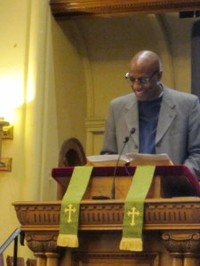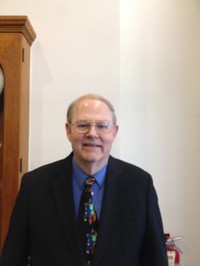How can Presbyterians be involved in the difficult work of addressing injustice and working for reconciliation?
That question has been weaving through a series of discussions at the Covenant Network of Presbyterians’ national gathering Nov. 5-7 in Denver – as when Clifton Kirkpatrick, a former stated clerk of the Presbyterian Church (U.S.A), said the debate in South Africa over the Confession of Belhar convinced him that “if there is no reconciliation there is no justice, there is no peace, there is no future.”
Kirkpatrick provided an international context: While the PC(USA) remains more than 90 percent white, as a former president of the World Alliance of Reformed Churches, he has heard the voices of Christians in the global South, many of them people of color, increasingly raising practical and theological questions of justice, inclusion, wrongs done and the need for repentance.
Day by day, a barrage of news provides the national context – with college students protesting racism, with #BlackLivesMatter activists naming wrongs and voicing outrage at inequitable treatment and violence against people of color.
“Race and privilege are still the dividing factors of our time,” said J. Herbert Nelson II, director of the PC(USA)’s Office of Public Witness in Washington, D.C.
There’s a church context as well. At the same time the Covenant Network was meeting with the theme of “Unity Matters,” a Conversation on Race, Ethnicity, Racism and Ethnocentricity was taking place at Stony Point Center in New York – a conversation resulting from a referral the National Racial Ethnic Ministries Task Force made to the 2014 General Assembly. The assembly instructed General Assembly moderator Heath Rada to appoint a planning team – and that team invited 40 Presbyterians who work on issues of racism to attend the conversation.
Using the hashtag #PCUSARacism on Twitter, participants spoke of imperialism, confession, reparations, repentance, power, white supremacy and much more. “This is sacred work,” vice-moderator Larissa Kwong Abazia wrote on Twitter. “Time to learn the old story to write a new story, old visions to create new ones.”
In Denver, Kirkpatrick and other speakers on Nov. 6 thanked the Covenant Network for its 19 years of working for full inclusion of gays and lesbians in the life of the church – celebrating that the PC(USA) now allows the ordination of gays and lesbians in partnerships and permits Presbyterian ministers to perform same-sex marriages if they choose.
They also challenged the Covenant Network and all Presbyterians to consider what comes next – to think of how they can get involved in pushing for justice, even if that advocacy comes at a cost.
WHAT’S NEXT?
Nelson, director of the PC(USA)’s Office of Public Witness in Washington, D.C., congratulated the Covenant Network on opening doors in the church for LGBTQ people – but said those who are white “will immediately have a space of privilege based on race” not provided for provided to people of color.

J. Herbert Nelson, II, director of the PC(USA) Office of Public Witness. —Leslie Scanlon
Nelson described the decision of the Presbyterian Mission Agency Board’s executive committee to select Tony De La Rosa as the interim executive director of the Presbyterian Mission Agency as a “courageous move.” Who would have thought that 15 months after the 2014 General Assembly voted to give PC(USA) ministers the freedom to perform same-gender weddings that “the same denomination would reach out beyond all the boundaries to select an openly gay married Latino man to begin the process of leading the denomination towards a new day?” Nelson said.
While crediting the Covenant Network for working fiercely for nearly two decades for full inclusion of LGBTQ people in the life of the PC(USA), Nelson posed the question of what Presbyterians will do next to address injustice outside the church – and how much are they willing to risk to do so.
He also encouraged Covenant Network leaders to cross boundaries and to work on issues from the world outside the PC(USA) – such as gun violence, pay inequity for women, matters of structural racism and sexism.
“Is the work of this organization over? If it is, you lack vision and you will perish, because there’s too much work to be done. There are too many people calling on you to ask the question, ‘How did you become liberated and what are the tools that you could use to help us, and will you stand with us in our struggle?’ because we can’t do it alone.”
Presbyterian pastors need to ask themselves how much they’re willing to risk to be activists for justice – even if their congregations don’t support them, even if their jobs might be at risk, Nelson said. He reminded the Covenant Network of the many pastors who worked for civil rights in the 1960s and who did lose their jobs, saying “it’s time for you to be those subversive agents and to help those who still have not been emancipated.”
CONVICTED BY BELHAR
Kirkpatrick, who served as co-chair of the General Assembly Special Committee on Belhar, spoke of growing up in Memphis, Tennessee in the 1950s and 1960s, where segregation was an everyday reality. After a year away at college, he returned to his home church to find white elders standing with their arms linked to keep out blacks.
Kirkpatrick told of his “second conversion” which came from seeing the ecumenical community in South Africa being willing to condemn apartheid because of a theological commitment to unity and justice. “I’ve never felt more morally compromised in my life” than while he was meeting with representatives of the Dutch Reformed Church, he said. Word came that the PC(USA)’s presbyteries had voted down a proposal to add the Belhar Confession on justice, unity and reconciliation to the PC(USA)’s Book of Confessions.
Now, Belhar is back before the PC(USA) – it will become part of the PC(USA) Book of Confessions if the General Assembly in Portland votes yes in June 2016.
“Racism is very much alive in America … . It’s alive in the PC(USA),” Kirkpatrick told the gathering. “This is not a time for groups like the Covenant Network to go out of business. It’s a time to get re-engaged.”

